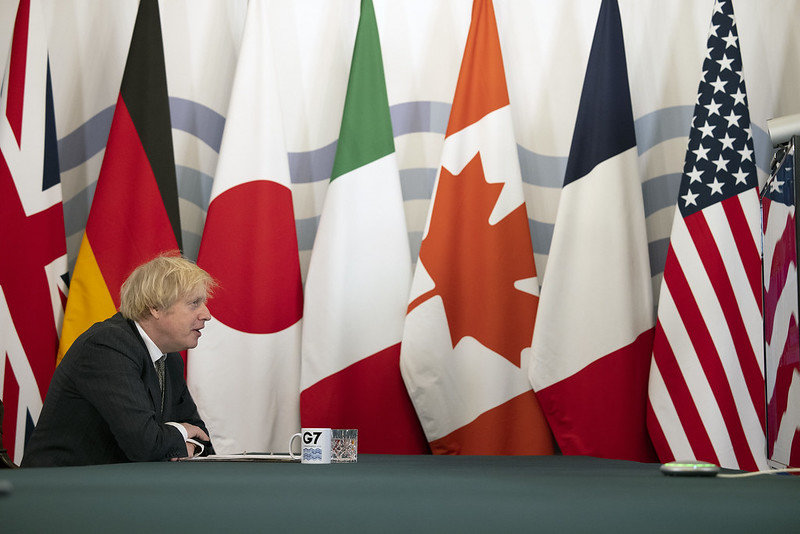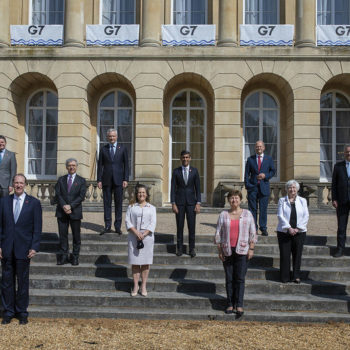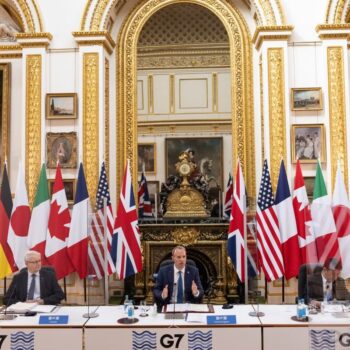- The Times newspaper reports Boris Johnson is to push G7 leaders to back a new climate change plan to help developing countries decarbonise their economies and limit global warming.
- E3G experts have responded in support of the idea, but say existing institutions could be used if reformed, and that extra funding will be needed.
Story
On 8 June, the Times newspaper reported on a significant ‘Marshall Plan’ initiative for the G7 to support developing countries in facilitating green and sustainable development. The concept would take the urgent need for short-term relief after the COVID19 and long-term structural challenges such as climate change into account.
Streamlining with other initiatives
It needs to be linked with existing initiatives, such as the Access to Finance taskforce and the Energy Transition Campaign, reinforcing each other to mobilise more transformative climate investment by COP26.
Funding
To have impact, the initiative will require a strong capital package to shift investment in developing countries from billions to trillions. Without funding, the initiative is at risk of becoming ineffectual.
Multilateral Development Banks
MDBs could be a centrepiece of the initiative. They would need to unleash their full potential through structural reform of how they operate as well as upping their financial firepower.
The UK role
Having the double presidency of COP26 and G7, the UK must lead the initiative and align it with the agenda for COP26. Recent cuts to the aid budget and a slow response to global vaccination have hampered its credibility. This initiative can be a building block to rebuild the UK’s leadership role around COP26.
Openness of the initiative
The initiative cannot be a confrontative initiative against countries with which the G7 is in competition. Its power will lie in inclusivity and openness to any country that agrees to its principles, be it a donor or recipient country.
The role for COP26
An ambitious result at COP26 is at serious risk due to a lack of new climate finance, suggesting donor countries are not serious about delivering on their $100 billion commitment. This initiative could be a key opportunity to put a credible investment plan for developing countries on the table that is considerate of their transformation challenge.
To fill the solidarity gaps left by G7 Climate and Finance Ministers – G7 leaders need to agree a comprehensive package of finance solidarity at their meetings in Cornwall this weekend. This should include meeting their promises on providing $100bn a year in climate finance as well as unlocking finance for green recoveries. This involves reallocating IMF Special Drawing Rights, committing to debt restructuring, and scaling up the resources of Multilateral Development Banks to invest in green recovery projects around the world.
Quote on the G7 Marshall Plan initiative
Julian Havers, E3G’s Public Banks expert said:
The G7 needs to step up and support developing countries in green and sustainable development and come forward with this green Marshall Plan. They must use COVID19 relief as an opportunity to rethink how international financial institutions can take the structural challenges of climate change into account.
Nick Mabey, E3G’s Executive Director said:
The credibility of the plan depends on three things. First, a strong capital package that will be able to shift investment in developing countries from billions to trillions. Without funding, the initiative risks becoming another paper tiger. Second, a principle-driven initiative that is clear on its promotion of net-zero, resilient development (green) and a strong emphasis on transparency, anti-corruption and human rights (clean). Third, openness of the initiative to any country that is keen to enter a path of green and clean development, as well as openness for any non G7 country to join the initiative if it adheres to its principles.
Claire Healy, Director of E3G Washington DC
This must be big and bold, not just another round of donor coordination. It should be about scaling up actual investment opportunities, underpinned by real money being put on the table, the whole capital stack brought to bear. There is no one size fits all approach. This must be about giving countries what they need, when they need to have the confidence to go all in on their energy transition.
Luca Bergamaschi, Co-Founder of the Italian think tank ECCO said
“If designed well, this is a major new opportunity for European countries to align their bilateral and multilateral support to their multilateral goals, norms and values. This could be the response that African economies and institutions such as UNECA are asking for: a new framework of resilient and inclusive development to build back forward together.”
Available for comment
Julian Havers, Programme Lead Public Banks and Just Transition
m: +49 (0) 1602120435, Julian.Havers@e3g.org
Claire Healy, E3G Washington DC Director, (COP26, geopolitics, US politics)
m: +1-202 420 0628, Claire.Healy@e3g.org
ENDS
Notes to Editors
- E3G is an independent climate change think tank accelerating the transition to a climate safe world. E3G specialises in climate diplomacy, climate risk, energy policy and climate finance. -> About
- What are the key tests for G7 Finance Ministers and Leaders? -> G7 Countdown
- E3G experts are available for wider G7 commentary –> Experts available for G7 comment
- For further enquiries email press@e3g.org or phone +44 (0)7783 787 863


